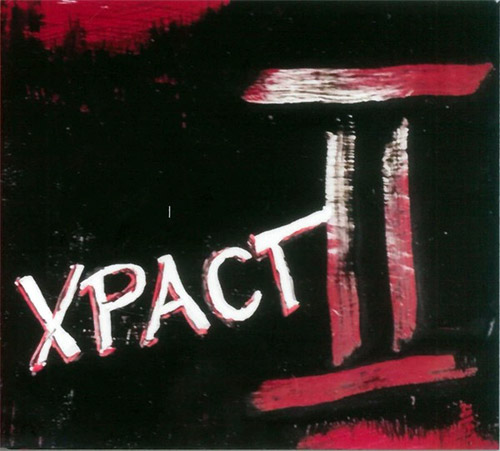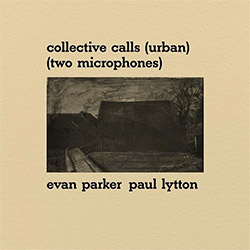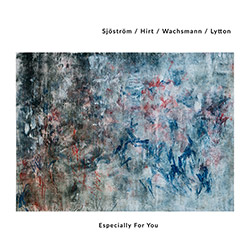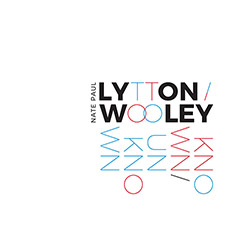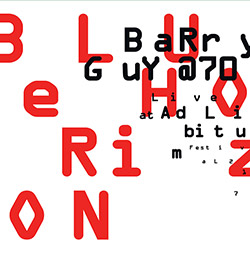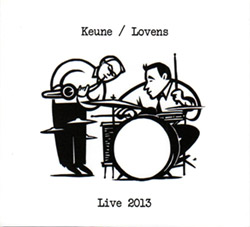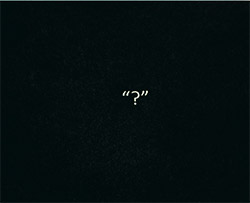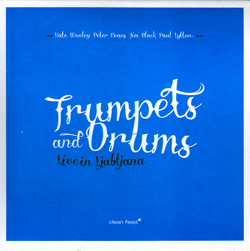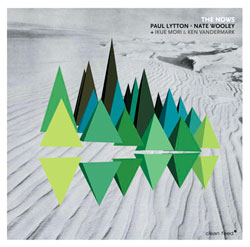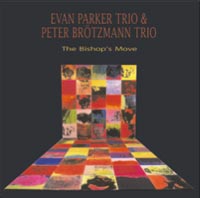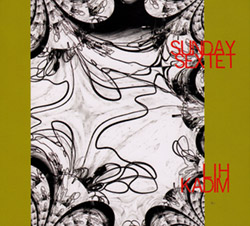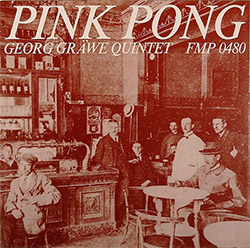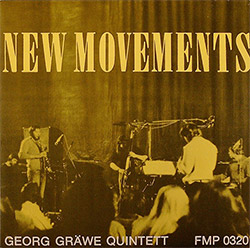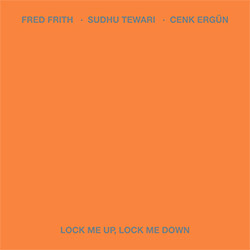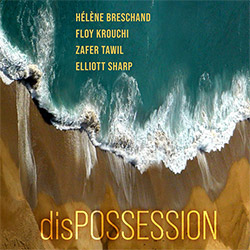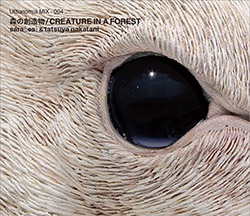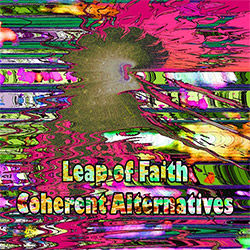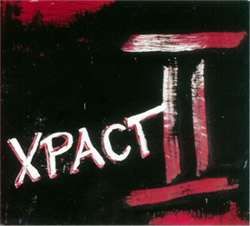
The XPACT quarter of late saxophonist Wolfgang Fuchs, percussionist/electronics artist Paul Lytton, bassist Hans Schneider and electric guitarist Erhard Hirt came together in the mid-80s from members of M.A.I. Orchestra and Übü Örchestrü, disbanding after 4 years and now reunited 34 years later as a quartet with Stefan Keuene replacing Fuchs, releasing this album of masterful free improv.
In Stock
Quantity in Basket: None
Log In to use our Wish List
Shipping Weight: 2.00 units
Sample The Album:
Stefan Keune-tenor saxophone
Paul Lytton-laptop, objects
Hans Schneider-double bass
Erhard Hirt-guitar, electronics
Click an artist name above to see in-stock items for that artist.
UPC: 642415162791
Label: FMR
Catalog ID: FMR 601
Squidco Product Code: 30330
Format: CD
Condition: New
Released: 2021
Country: UK
Packaging: Digipack - 3 panel
Recorded at King Georg, in Cologne, Germany, on September 25th, 2020, by Miguel Ortiz Caturani.
"The golden age of second generation improvised music in Germany.
This freight train phrase describes an object of study that's been woefully under-attended relative to its counterparts in London, Amsterdam, and New York. In the late 1970s and early 1980s, across Germany, especially in the north, with outposts in smaller cities like Witten, Wuppertal, Leverkusen, Wiesbaden, and Aachen, musicians gathered as workshops, cooperatives, and collectives, presenting themselves in festivals, projects, or "meetings," following the example set out by Jost Gebers and Peter Brötzmann's Berlin-centered first wave free music organization, Free Music Production (FMP), away from which these regionally diffuse platforms pushed. The scenes cross-pollenated, germinated, grew into their own particular musical ecosystems. Some amalgamations were fleeting; others were longer lasting. A few jelled into bona fide bands.
XPACT was one of the strongest of the second gen German free music working bands. A quartet, XPACT took shape in M.A.I. Orchestra, a large improvising ensemble founded in Witten by pianist Martin Theurer, which included all four members. Guitarist Erhard Hirt and bassist Hans Schneider were both from Leverkusen and had been working together since their late teens. Schneider was part of a trio with saxophonist and clarinetist Wolfgang Fuchs; the group recorded an LP for FMP in 1979. Hirt led a quartet with Fuchs, Schneider, and drummer Jochen Twelker at the Moers Music Festival the same year. In 1981, Paul Lovens introduced Hirt to British ex-patriot percussionist Paul Lytton. (Lytton is technically a first generation improvisor, having come of age in the London jazz scene of the mid 1960s.) Hirt and Lytton recorded never-issued duets before teaming up in 1982 with Fuchs and Schneider. And XPACT was born.
This foursome was the core of another classic group of the scene, King Übü Örchestrü, which, unlike M.A.I., was international in scope, incorporating non-German members from Switzerland, Austria, the U.K., and Italy. After a short stint as a collective, Fuchs and Hirt assumed leadership of Übü; the dispute between them that led to Hirt leaving the large group in 1986 also precipitated the disbanding of XPACT. During its four-year run, XPACT played together extensively, developing a unique approach to small group interplay documented in synopsis on their lone LP, Frogman's View, released on the FMP subsidiary Uhlklang.
Fast-forward 34 years. XPACT reboots in a different world. Tragically, Fuchs died of a heart attack in 2016. In his place, Stefan Keune brings his own less oblique sensibility, portaging some of the tongue-centric vocabulary of his predecessor, adding fulsome tonal directness, identifying a clear position amid the old comrades, who fall together like dear friends around a table, estranged for forgotten reasons, reunited to see if there's spark left. There's more than a spark here. This is spectacularly sharp improvising. It is purely organic, elementally sonic, reveling in crunchy timbre and texture, building on the productive confusion of electronic and acoustic pitches and noises. I'm reminded why I was riveted to Frogman's View back in the day - Schneider's sparkling arco, Hirt's versatility and quickness, Lytton's warmth, musicality, and humor. The richest spoils of this music are found in the band's interaction. There, in sudden changes of direction or unexpected protractions, you can hear how, against all odds, all members having grown and changed over the years, XPACT is somehow still XPACT."-John Corbett, Chicago, November 2020
Artist Biographies
• Show Bio for Stefan Keune "Stefan Keune: Born in Oberhausen, Germany, 1965 From 1982, Stefan Keune studied privately with various teachers starting on the tenor saxophone. He was attracted to free improvised music from the beginning while using classical techniques from contemporary music as the basis of his playing. Keune began playing in local groups from 1985 (with Martin Blume amongst others) and since then he has intensively dedicated himself to the different kinds of improvised music. In 1990 he established contacts, first of all with Paul Lytton, then also with Dietmar Diesner, Matthias Bauer and others. In 1991, together with Lytton and bass player Hans Schneider he founded the "Stefan Keune Trio", and in 1992, the CD Loft was released. This was followed by an intense chamber-music-like phase of work, for example in a quartet with Paul Lovens, John Russell and Hans Schneider. He has played in close association with British free improvisors such as Roger Turner, Phil Durrant, John Butcher and others as well as with the other European improvisors such as Mats Gustafsson, Raymond Strid, Radu Malfatti and Peter Kowald. Recent groupings include a duo with John Russell, a duo with Paul Lovens, a trio with Dominic Lash and Steve Noble, a trio with Georg Wolf and Jörg Fischer, a quartet with Hans-Peter Hiby, Raoul van der Weide and Martin Blume and also one of the seminal groups within German free improvisation, XPACT (with Erhard Hirt, Hans Schneider and Paul Lytton)." ^ Hide Bio for Stefan Keune • Show Bio for Paul Lytton "Paul Lytton (born 8 March 1947, London) is an English free jazz percussionist. Lytton began on drums at age 16. He played jazz in London in the late 1960s while taking lessons on the tabla from P.R. Desai. In 1969 he began experimenting with free improvisational music, working in a duo with saxophonist Evan Parker. After adding bassist Barry Guy, the ensemble became the Evan Parker Trio. He and Parker continued to work together into the 2000s; more recent releases include trio releases with Marilyn Crispell in 1996 (Natives and Aliens) and 1999 (After Appleby). A founding member of the London Musicians Collective, Lytton worked extensively on the London free improvisation scene in the 1970s, and aided Paul Lovens in the foundation of the Aachen Musicians' Cooperative in 1976. Lytton has toured North America and Japan both solo and with improvisational ensembles. In 1999, he toured with Ken Vandermark and Kent Kessler, and recorded with Vandermark on English Suites. Lytton also collaborated with Jeffrey Morgan (alto & tenor saxophone), with whom he recorded the CD "Terra Incognita" Live in Cologne, Germany. He played also on White Noise's pioneer electronic pop music album An Electric Storm in 1969." ^ Hide Bio for Paul Lytton • Show Bio for Hans Schneider "Hans Schneider started playing in 1964 in a variety of beat, rock and jazz groups, joining the Georg Graewe Quintet in 1974. This has been a long standing working relationship which has included work with the GrubenKlangOrchester, though with a break from around 1983 and resurrected in 1990 to produce, among other things, the excellent recorded work of Spellings by Frisque Concordance. Another long working relationship was formed with Wolfgang Fuchs in 1978 via a trio with Klaus Huber on drums, through Xpact with Erhard Hirt on guitar and Paul Lytton on percussion and the foundation, with Fuchs, Hirt and others, of the King Ubu Orchestru. Hans Schneider was organiser of the first 'Internationale tage fur improvisierte musik' in Leverkusen in 1982 and was organiser and art director for the 1990 'Tage der improvisierten musik' [Days of improvised music] in Leverkusen. His list of collaborators includes Floros Floridis, Maggie Nichols, Peter Kowald, John Tchicai, Alex von Schlippenbach, Phil Minton, Sven-Ake Johansson, Kenny Wheeler, Peter Broetzmann, John Russell, David Moss, Gerry Hemingway, Alan Tomlinson, Klaus Koch, Phil Wachsmann, Gunter Christmann, Robert Dick, Evan Parker, Sebi Tramontana, Carlos Zingaro, and Fred van Hove. Current working ensembles include the Hans Schneider-Dorothea Schurch Duett - music for double bass and voice; Xpact [new version] with Dorothea Schurch and Paul Lytton, a trio/quartet with Paul Rutherford, Paul Lovens /and John Russell, and the 'Gratkowski Chamber Trio' with English tuba player Melvyn Poore and Frank Gratkowski." ^ Hide Bio for Hans Schneider • Show Bio for Erhard Hirt "Erhard Hirt (born October 31, 1951 in Bonn ) is a German jazz and improvisation musician ( guitar, electronics). Hirt initially played self-taught blues before working with jazz-oriented rock bands from 1970. From 1974 he played in the experimental group "Jazz community," but in addition also with blues bands like the "Delta Blues Band" or "Matt Walsh blues band" before he founded his own improvisation ensemble in 1979, with whom he on the 1981 Moers Festival occurred. He then played with Wolfgang Fuchs, Hans Schneider and Paul Lytton in the group XPACT, which recorded the album "Frogman's View" in 1984, but also in a trio with Schneider and Radu Malfatti. In addition to Fuchs, Malfatti and Lytton, he was involved in founding the European "King Übü Orchestrü" in the mid-1980s. He appeared in a trio with Phil Minton and Willi Kellers, and in a duo with Lol Coxhill. In 1990 he formed a duo with Dietmar Diesner, in 1992 he was a member of the Humannoise Ensemble, along with Helmut Bieler-Wendt, Maud Sauer and Uwe Oberg. He continued to work with Anne LeBaron, Phil Wachsmann and Alfred Zimmerlin, with Minton and John Butcher (CD 1996) and with the multi-instrumentalist Martin Klapperand with the Swiss vocalist Dorothea Schürch. But since 1977 he has also performed solo projects, presented solo albums and toured the United States with them. He has also performed with other guitarists such as Derek Bailey, Hans Reichel, Joe Sachse, Uwe Kropinski, Eugene Chadbourne, Jean-Marc Montera and Stephan Wittwer. In the guitar quartet Extended Guitars he meets Keith Rowe, Hans Tammen and Nick Didkovsky. Since 1997 he has been part of the Ensemble Realtime, in which improvisers from North Rhine-Westphalia such as Mark Charig,Gunda Gottschalk, Ute Völker, Melvyn Poore, Stefan Keune and Thomas Lehn work together. He recorded the album "Trinidad" (1999) with Lehn and Martin Theurer. In 1984 Hirt received the WDR's "Town Music Prize". According to the journal "Guitar Techniques", he is "one of the most original and fascinating experimental solo guitarists at the moment..." " ^ Hide Bio for Erhard Hirt
4/24/2024
Have a better biography or biography source? Please Contact Us so that we can update this biography.
4/24/2024
Have a better biography or biography source? Please Contact Us so that we can update this biography.
4/24/2024
Have a better biography or biography source? Please Contact Us so that we can update this biography.
4/24/2024
Have a better biography or biography source? Please Contact Us so that we can update this biography.
Track Listing:
1. Restart 29:37
2. Immersion 8:15
3. In Between 11:32
4. After All 3:15
Improvised Music
Jazz
Free Improvisation
Electro-Acoustic
Electro-Acoustic Improv
European Improvisation, Composition and Experimental Forms
Search for other titles on the label:
FMR.


